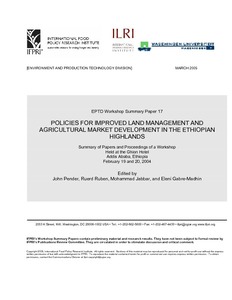Focal point
Location
About IFPRI
The International Food Policy Research Institute (IFPRI) provides research-based policy solutions to sustainably reduce poverty and end hunger and malnutrition in developing countries. Established in 1975, IFPRI currently has more than 500 employees working in over 50 countries. It is a research center of theCGIAR Consortium, a worldwide partnership engaged in agricultural research for development.
Vision and Mission
IFPRI’s vision is a world free of hunger and malnutrition. Its mission is to provide research-based policy solutions that sustainably reduce poverty and end hunger and malnutrition.
What We Do
Research at IFPRI focuses on six strategic areas:
- Ensuring Sustainable Food Production: IFPRI’s research analyzes options for policies, institutions, innovations, and technologies that can advance sustainable food production in a context of resource scarcity, threats to biodiversity, and climate change. READ MORE
- Promoting Healthy Food Systems: IFPRI examines how to improve diet quality and nutrition for the poor, focusing particularly on women and children, and works to create synergies among the three vital components of the food system: agriculture, health, and nutrition. READ MORE
- Improving Markets and Trade: IFPRI’s research focuses on strengthening markets and correcting market failures to enhance the benefits from market participation for small-scale farmers. READ MORE
- Transforming Agriculture: The aim of IFPRI’s research in this area is to improve development strategies to ensure broad-based rural growth and to accelerate the transformation from low-income, rural, agriculture-based economies to high-income, more urbanized, and industrial service-based ones. READ MORE
- Building Resilience: IFPRI’s research explores the causes and impacts of environmental, political, and economic shocks that can affect food security, nutrition, health, and well-being and evaluates interventions designed to enhance resilience at various levels. READ MORE
- Strengthening Institutions and Governance: IFPRI’s research on institutions centers on collective action in management of natural resources and farmer organizations. Its governance-focused research examines the political economy of agricultural policymaking, the degree of state capacity and political will required for achieving economic transformation, and the impacts of different governance arrangements.
Research on gender cuts across all six areas, because understanding the relationships between women and men can illuminate the pathway to sustainable and inclusive economic development.
IFPRI also leads two CGIAR Research Programs (CRPs): Policies, Institutions, and Markets (PIM) andAgriculture for Nutrition and Health (A4NH).
Beyond research, IFPRI’s work includes partnerships, communications, and capacity strengthening. The Institute collaborates with development implementers, public institutions, the private sector, farmers’ organizations, and other partners around the world.
Resources
Displaying 1006 - 1010 of 1521Social pathways from the HIV/AIDS deadlock of disease, denial and desperation in rural Malawi
For the past 20 years, AIDS in Sub-Saharan Africa has been considered a disease of high mobility largely associated with political strife1 or urbanization.2 With its largely peaceful recent history and heavily rural population, however, Malawi poses several challenges to existing assumptions about this demographic and social profile of the disease. Adult HIV prevalence in the country was estimated at 14.1 per cent in 2005, among the highest in the world. More than half a million Malawians have died of AIDS to date in a country of approximately 11 million people.
Influences of Programs and Organizations on the Adoption of Sustainable Land Management Technologies in Uganda
Governments are devolving service and infrastructure provision, regulatory authority, and decisionmaking in many developing countries. Market reforms and structural adjustment policies devolve the provision of services and infrastructure to nongovernmental organizations (NGOs), community-based organizations (CBOs), and the private sector (Farrington and Bebbington 1993; Uphoff 1993; Pender and Scherr 2002).
Indonesia: Coping with economic and political instability
Indonesia is a Southeast Asian archipelago consisting of some 17,500 equatorial islands (6,000 of which are inhabited) stretching in an east–west direction over 5,000 kilometers. It has a land area of 1.83 million square kilometers; in 2000 this supported a population of 203.5 million (the fourth largest in the world), which is growing at about 1.4 percent per annum. While the overall population density is about 111 persons per square kilometer, 59 percent of the population lives on the island of Java, which has a population density of 944 persons per square kilometer.
Strategies for Sustainable Land Management in the East African Highlands: Conclusions and Implications
The studies in this book sought to understand the factors affecting rural households’ choice of income strategies and land management practices and the implications of these decisions and of policy- and program-relevant factors for agricultural production, household welfare, and land degradation. We noted at the outset that the factors influencing these decisions and outcomes are many and complex and that their effects may be very context-dependent in a region as diverse as the East African highlands. The findings in the preceding chapters amply support this hypothesis.
Policies for improved land management and agricultural market development in the Ethiopian highlands
“The objectives of this workshop are to review and discuss the main findings and policy implications of recent research conducted on these topics by IFPRI, Wageningen University and Research Center (WUR), the International Livestock Research Institute (ILRI), Mekelle University (MU), the Ethiopian Agricultural Research Organization (EARO) and other Ethiopian collaborators; to discuss options for improving the development of agricultural markets and land management in Ethiopia, considering different stakeholders’ perspectives; and to develop recommendations for priority policy actions and fu




